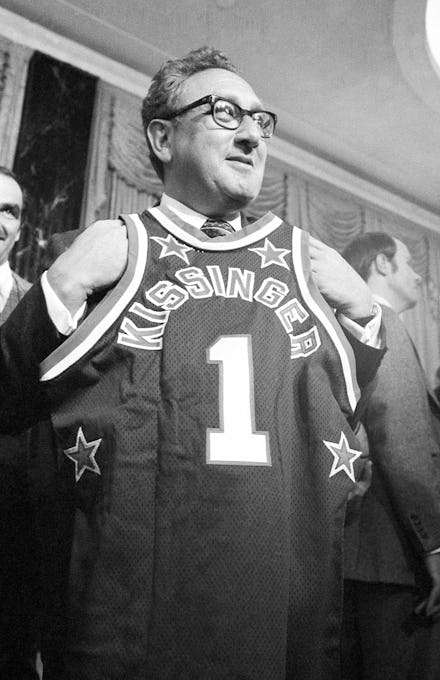The U.S. Came Close to "Smashing" Cuba in the 1970s, New Documents Reveal

The news: Former Secretary of State Henry Kissinger drew up secret plans to "smash" Cuba with airstrikes in retaliation for Fidel Castro's decision to send troops to fight alongside Angolan communists in 1975, according to new documents unclassified at the request of the National Security Archive.
During a 1976 meeting with top security officials, including Gen. George Brown of the Joint Chiefs of Staff and Secretary of Defense Donald Rumsfeld, Kissinger instructed attendees that "if we decide to use military power it must succeed. There should be no halfway measures."
Kissinger also told President Gerald Ford that "I think we are going to have to smash Castro. We probably can't do it before the [1976 presidential] elections." Ford responded, "I agree."
The plan: The plans apparently included detailed lists of potential targets, including ports and military installations, as well as instructions for U.S. Marines based at Guantanamo Bay to "clobber" Cuban forces.
But Kissinger's scheme may have been less strategic and more personal: According to Cuba expert Peter Kornbluh, who coauthored Back Channel to Cuba with American University professor William M. LeoGrande, Kissinger was especially angry at Castro because the Cuban government's decision to send soldiers to Angola conflicted with Kissinger's attempts to normalize U.S.-Cuba relations. In fact, the documents show he was more or less fuming — determined to "humiliate" the Cubans.
"Nobody has known that at the very end of a really remarkable effort to normalize relations, Kissinger, the global chessboard player, was insulted that a small country would ruin his plans for Africa and was essentially prepared to bring the imperial force of the United States on Fidel Castro's head," Kornbluh told the New York Times. "You can see in the conversation with Gerald Ford that he is extremely apoplectic ... [he used] language about doing harm to Cuba that is pretty quintessentially aggressive."
"These were not plans to put up on a shelf," LeoGrande added. "Kissinger is so angry at Castro sending troops to Angola at a moment when he was holding out his hand for normalization that he really wants to, as he said, 'clobber the pipsqueak.'"
Below is a sample of the March 24, 1976, transcript of the Washington Special Actions Group, in which Kissinger is also charmingly worried about the possibility of Cuban power aggravating "disaffected minorities" into open revolt across the Caribbean and the United States:
What a bad idea: The meeting apparently resulted in the creation of two documents, Cuban Contingency Plan Paper 1 and Paper 2. Paper 1 is a basic plan of action: It outlines four courses of action against Cuba and the USSR to keep the two out of regional conflicts, focusing on political measures along with blockades and punitive air strikes to dissuade Cuba from intervening in Africa.
Paper 2 is more of a bucket list: It details USSR-Cuba relations and identifies vulnerabilities in the Cuban defenses, as well as lays out specific plans to carry out Kissinger's desired humiliation. Among the risks for some of the strategies are real barn-burners like "immediate risk of direct U.S.-Soviet military confrontation at sea," "possible airstrikes against U.S. forces" "high risk of military clashes ... possibly involving Soviet personnel" and — if U.S. airstrikes began — "risk of Soviet reprisal action elsewhere in the world. A high risk of direct U.S.-Soviet military confrontations during strike operations."
In other words, Kissinger knew an air war with Cuba would enrage the USSR and exacerbate Cold War tensions, possibly leading to skirmishes or open battle with Soviet troops. While he'd prefer to avoid that dirty business, he was quite willing to take that risk on if it was determined military strikes were the only way to curb Cuban involvement in Africa. (For the record, in 1975 the USSR had 19,055 nukes.)
Thank God that Ford never carried out this ludicrous plan, which has all the hallmarks of classic Kissinger: Domino theory? Check. Brutal use of force to obtain U.S. strategic objectives? Check. Disregard for a war-weary public that just got out of Vietnam? Bingo.
Considering the U.S. repeatedly tried to dethrone Castro using methods as varied as proxy invasion and assassination attempts, perhaps Kissinger was also underestimating his Communist foe.
"If there is a perception overseas that we are so weakened by our internal debate [over Vietnam] so that it looks like we can't do anything about a country of eight million people, then in three or four years we are going to have a real crisis," Kissinger says in the documents. But hey, guess who's still in power?